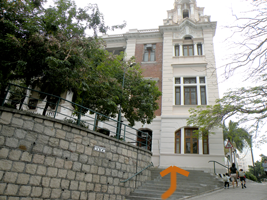
Professor Christopher Hutton (chutton@hku.hk)
Dr Adrian Pablé (apable@hku.hk)
School of English, The University of Hong KongMain sponsor: The Lee Hysan Foundation, Hong Kong
¡@
![]()
This colloquium marks an important crossroads in the academic study of language. The nature of the discipline of linguistics, its role and positioning within the sciences, social sciences and humanities, and its goals, methods and theoretical foundations are beset by uncertainty. This meeting seeks to address fundamental questions concerning the nature of the academic study of language, its future direction, and the themes, methods and issues by which it should be shaped. Integrational linguistics is a lay-oriented inquiry or mode of investigation - it regards all language users as in some sense linguists. Rather than presenting itself as a science with a "God's truth" insight into language, integrationism takes seriously the diversity of beliefs about language found at the individual, contextual and cultural level. Following on from this, the conference aims to draw on Hong Kong's positioning to explore ideas about language in a cross-cultural context, with a special session applying the "China-West" framework to the study of language.
The publication of Franz Bopp's Uber das Conjugationssystem der Sanskritsprache (1816) and of Ferdinand de Saussure's Cours de Linguistique Generale (1916) in retrospect both marked fundamental moments in the academic study of language in the West. In the 19th century the discipline of comparative-historical linguistics ("comparative philology") emerged, staking a claim to scholarly, even scientific rigor, with Indo-European studies at its centre. The 20th century saw the rise of an autonomous academic discipline, "linguistics", with its central idea of a synchronic linguistic system. The post-1945 world-wide expansion of linguistics coincided with decolonization, and this brought the politics of language and language planning to centre stage. The advent of Chomskyan theory, however, seemed to offer linguistics an alliance with, or even a dominant role within, psychology and biology. Within this framework language as a social institution was marginalized in favour of what was perceived as the core "language faculty" and the requirement of an autonomous and systematic object of study. Modern sociolinguistics as it developed was divided between this commitment to a "hard" scientific (quantitative) framework and an anthropological exploration of community, identity and social roles. The conference seeks to mark a new century of linguistic theorizing by posing fundamental questions about the future of the discipline.
The integrational critique of linguistics has focused on a set of interlocking presuppositions, including the autonomy of linguistics, its identification of the linguistic system as an object of study, and related notions of linguistic form and meaning. While this critique - and its corollary in the advocacy of a lay-oriented linguistics - has been to a degree in tune with discussions of meaning and interpretation in literary theory, reflexive sociology and anthropology, as well as in important strands in philosophy and the philosophy of science, mainstream linguists have responded, if at all, by pointing to the lack of a reproducible method with which to analyze 'data'.
Intergrational linguistics takes seriously the embedding of ideas about language in cultural traditions, socio-political contexts, and their role in cross-cultural interactions and intellectual development. It challenges the idea of linguistics as a neutral science, and asserts the fundamental importance of context in all the various meaning of that term for the understanding of language.
¡@
![]()
- The disciplinary autonomy of linguistics
- Sociolinguistic theory
- Linguistics and semiotics: theories of the sign
- Indeterminacy and theories of meaning
- Lay-oriented linguistics;
- Culturally-embedded and "pre-modern" understandings of language
- Integrational linguistic method (of enquiry, analysis, argumentation); the nature of linguistic 'data'
- Integrational linguistics in the university curriculum
![]()
The Faculty of Arts at the University of Hong Kong has as its Strategic Research Theme "China-West Studies", including language and culture studies (see http://arts.hku.hk/research/china_west.html). It is proposed to organize a special session devoted to "China-West" language studies, with special reference to cross-cultural issues in the understanding and representation of language, interactions between linguistic traditions, the nature of writing systems, the status of the term "dialect", etc.
¡@
![]()
Key-note speaker
Professor Roy Harris, University of Oxford [in absentia]Invited Scholars
David Bade, University of Chicago
Peter Jones, University of Sheffield
Alexander Kravchenko, Baikal National University
Zhu Lei, Shanghai East China Normal University
Nigel Love, University of Cape Town
Markus Messling, University of Potsdam
Michael Toolan, University of Birmingham
Guy Tunstill, Government of South Australia
Edda Weigand, University of Munster
Rukmini Bhaya Nair, Indian Institute of TechnologyThe University of Hong Kong
Chan Man Sing, School of Chinese
Christopher Hutton, School of English
Adrian Pablé, School of English
Paul Thibault, Faculty of EducationPostgraduate Students
Noel Christe, University of Lausanne
Bjarke Damm, University of Copenhagen
Zhou Feifei, Shanghai East China Normal University
Marc Haas, University of Oxford
Candice Ng Sheung Pui, University of Hong Kong
Jan Wawrzyniak, Warsaw University
Jeremie Wenger, University of Lausanne
Line Brink Worsoe, University of Copenhagen
¡@
![]()
Click here to download the Programme in pdf file.
![]()
Room 113G, Main Building
The University of Hong Kong
Pokfulam Road
Hong Kong

¡@
![]()
Contact person: Professor Christopher Hutton (chutton@hku.hk)
¡@
¡@
![]()
Please click here to download the photos.
¡@